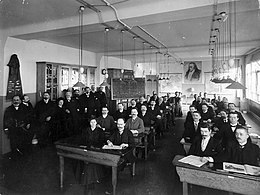Reichsparteischule (SPD)
The SPD's Reichsparteischule was founded on November 15, 1906 at Lindenstrasse 3 in Berlin . It was the first permanent establishment of a German party that specifically trained party functionaries. It was closed with the beginning of the First World War .

founding
The establishment of the Reichsparteischule was mainly driven by August Bebel and was related to the programmatic disputes within the SPD at that time. With the training of leading comrades, Bebel not only wanted to increase their clout in the political debate, but also to counter reformist currents that instead of class struggle focused on parliamentary work and reforms of the existing social system. However, the orientation of the school aimed at by Bebel was never fully implemented, as reform-oriented social democrats soon also taught at it. Another reason was that other parties and currents began to train their functionaries as well, in some cases with an express orientation against social democracy. However, these institutions did not have regular schools, but only offered their members and supporters shorter courses.
classes
The lessons took place in the winter half of the year. Each course comprised up to 30 SPD functionaries who were proposed by the party districts for the course and selected by the party executive committee, education committee and teaching staff. During the courses, the party covered the cost of living for the participants and their families.
Teacher
The founding college comprised eight lecturers: Rudolf Hilferding , Franz Mehring , Anton Pannekoek , Kurt Rosenfeld , Simon Katzenstein , Heinrich Schulz , Arthur Stadthagen and Hugo Heinemann . The Prussian police closely monitored the facility and in 1907 threatened Rudolf Hilferding and Anton Pannekoek with expulsion because they were foreigners (Hilferding Austrians, Pannekoek Dutch). They left the college, Rosa Luxemburg , Emanuel Wurm and Heinrich Cunow came as new lecturers.
student
During the eight years that the Reichsparteischule was in existence, they attended 203 students, including 20 women. Among other things Wilhelm Kaisen , Wilhelm Pieck , Fritz Tarnow and Jacob Walcher formed thereon.
curriculum
The curriculum primarily comprised various legal topics (labor law, social law, civil law, constitutional law, criminal law and civil law). Added to this were economics , trade unions and cooperatives, local politics, Marxism , rhetoric and the history of political parties.
school books
J. Walcher added a list of books to the transcript of a lecture that he had used for the party school year in Berlin in 1910: “Duden, Dictionary; Wustmann, linguistic stupidity; Statistical yearbook; Mehring, Gustav Adolf; Karl Marx, Capital I.Bd .; Plötz, story; Mehring, Jena - Tilsit; Engels, Peasants' War; Wolf, Collected Writings; Rousseau, social contract; Campanella, sunny state; Knowledge is power; Communist Manifesto; Kautsky, Precursors of Socialism, Vol. I and II; Marx, Misery of Philosophy; Büchner, Hessischer Landbote; More, Utopia; Lasalle's works; Labor law; Tolstoy, What is Art ?; Brazil; Social constitution of the Inca Empire; Pertes, Atlas; Financial reform; Mehring, Schiller; Plekhanov, Marxism; Bebel, Woman and Socialism "
literature
- Heinz Germany: On the 100th anniversary of the opening of the social democratic party school in Berlin. A memory report by Alfred Keimling, in: Yearbook for Research on the History of the Workers' Movement , Volume III / 2006.
- Franz Osterroth / Dieter Schuster: Chronicle of the German Social Democracy. Vol. 1: Until the end of the First World War. Bonn, Berlin, 1975. p. 124
- Jacob Walcher: Rosa Luxemburg as a teacher . (Jacob Walcher, student at the SPD Reichsparteischule 1910), unpublished. Manuscript in: Jacob Walcher's estate SAPMO